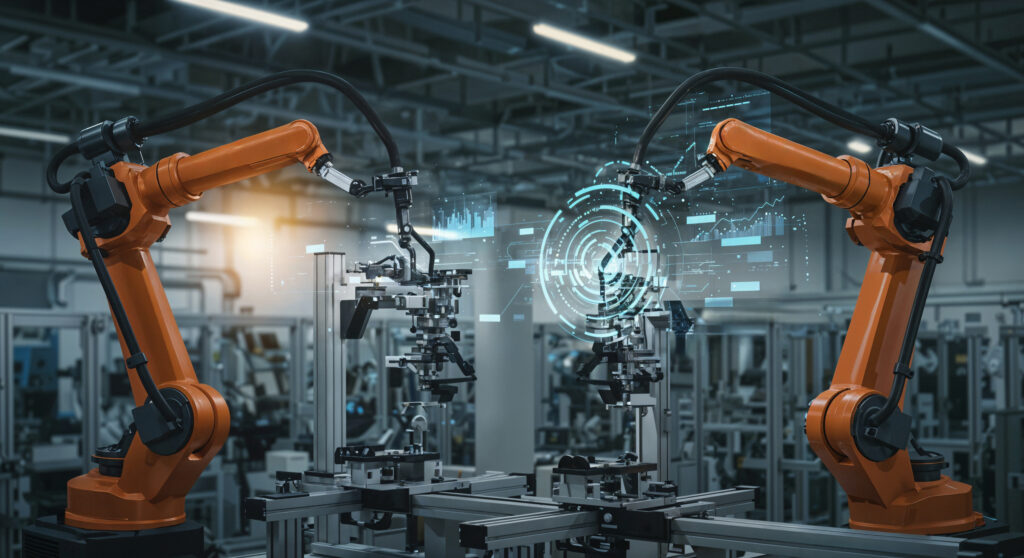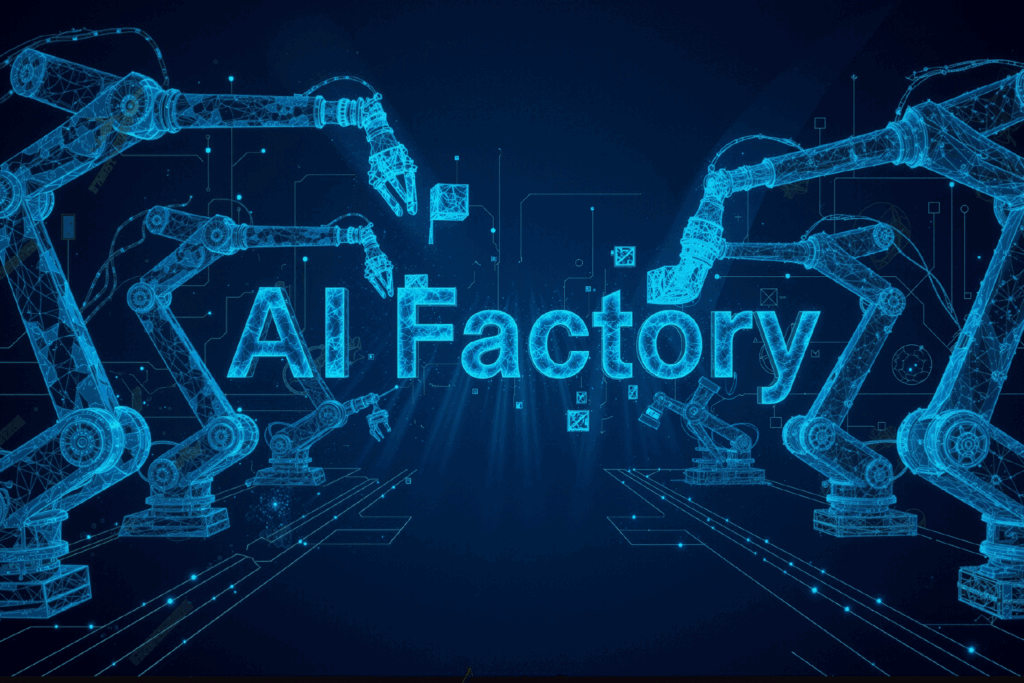Introduction
Imagine a world where industry not only produces, but also thinks, anticipates, and decides. This world has already begun and is closer than many imagine.
McKinsey study , companies that adopt AI on a large scale can increase their industrial productivity by up to 20% and reduce operating costs by 15% or more . These gains come not just from faster robots or more accurate sensors, but from the real intelligence behind operations—the kind that learns from data, identifies patterns, and transforms decisions into competitive advantage.
This is where Industry 4.0 stops being a promise and becomes reality . The combination of operational data, connectivity, and AI is reshaping the way factories, production lines, and logistics centers operate. More than just automation, it's about making operations intelligent, adaptive, predictive, and connected to business strategy.
In this article, we'll explore what's actually changing with the arrival of AI in industry. We'll understand how it's being applied, which sectors are already reaping the benefits, and why platforms like Skyone Studio are opening a new chapter in this revolution: data-driven operations powered by artificial intelligence.
Enjoy the read!
Industry 4.0: concept, evolution and pillars of smart operations
Far beyond a buzzword, Industry 4.0 represents one of the most profound transitions since traditional automation . It's the turning point where digital technologies begin to drive production decisions, transforming factories into living, connected, and intelligent environments.
According to Senai , Industry 4.0 is defined as the application of technologies such as the Internet of Things (IoT), Artificial Intelligence (AI), Big Data and Cloud Computing to make processes more autonomous, efficient and integrated, generating value throughout the production chain.
But beyond the concept, the impact is already visible in practical cases. For example, on an automotive assembly line , connected sensors can monitor part wear in real time, automatically triggering predictive maintenance orders. In the food industry , algorithms can adjust production rates based on weather variations and retail demand. In the pharmaceutical industry , AI can analyze large volumes of clinical data to accelerate the research and development of new drugs.
These are just a few real-life examples of how Industry 4.0 transforms production logic : we move from assumption-based decisions to a data-driven , where every action is based on data, context, and machine intelligence.
The main pillars supporting this new industry include:
- Real-time connectivity : with machines, systems and people exchanging information fluidly and continuously;
- Data as a strategic asset : with traceability, history and actionable insights
- Adaptive automation : which goes beyond repetition and acts based on context and predictions;
- Integration between physical and digital systems : with orchestrated flow between sensors, ERPs, CRMs and intelligent platforms;
- Operational flexibility : able to respond to market changes, technical failures or personalized demands with agility.
All of this, however, can only be achieved with one key element : artificial intelligence applied to operations, becoming the "engine" of a truly intelligent industry.
In the next section, we'll continue exploring how different sectors are already reaping the benefits of this revolution, with gains in productivity, efficiency, and scale !
Where AI is already making a difference: featured sectors
It's no exaggeration to say that artificial intelligence has already become a key player on the industrial competitiveness board . But where, exactly, is it already changing the game?
Below, we've separated out different sectors that are incorporating AI in a practical way, and the value this has generated for them:
- Pharmaceutical and healthcare industry : From molecules to medical records, AI is already operating throughout the entire supply chain. Laboratories like Pfizer and Novartis use algorithms to reduce years of research into weeks, while hospitals apply machine learning models to predict risks and support diagnoses. According to Mordor Intelligence , the AI market in the pharmaceutical industry is expected to grow from US$4.3 billion (2025) to US$25.3 billion by 2030, resulting in annual growth of +42.68% .
- Agribusiness : In the field, AI is no longer a promise, but a routine. Autonomous tractors, soil sensors, and drones help producers predict harvests, monitor pests, and apply inputs with precision. In Brazil, this market is expected to grow 7.67% annually through 2029, driven by precision agriculture solutions and intelligent automation .
- Manufacturing and Automotive : Maintenance has gone from being corrective to predictive. With AI, machines can warn before stopping. This reduces failures, prevents waste, and improves productivity. According to Market.us , the global AI market for predictive maintenance is already worth over $800 million and growing rapidly driver- assistance systems (ADAS ) and autonomous vehicles are also powered by real-time algorithms.
- Industrial logistics and supply chain : AI has become an ally for those who need to deliver more while spending less. With algorithms that optimize routes, inventory, and purchasing, companies have been able to save up to 15% on logistics costs and improve service levels by 65%, according to DataRobot . We could say it's like putting an analytical brain at the center of the operation.
These examples make it clear: artificial intelligence is already playing in the field , generating high value, anticipating problems and raising the standard of operations in strategic sectors.
And what comes next is even more powerful: next, we'll see how this AI has evolved, from predictive to the generative revolution!
How AI is being applied: from predictive to generative AI
If AI was once seen as the icing on the cake in operations, today it is the very engine of transformation. Instead of simply analyzing what happened, it now predicts, decides, and even executes. From predictive maintenance to decision-making co-pilot, what we are seeing is the emergence of a new type of operation : lively, responsive, and deeply connected to data.
Let's better understand this evolution through four fronts that are already reshaping the routines of companies across various sectors.
Predictive analysis and process automation
Imagine a machine that "warns" you when it's about to fail. Or a system that adjusts production pace based on changing demand, without needing a single new line of code. This is the silent revolution of predictive analytics: algorithms that interpret sensor patterns, history, and external variables to anticipate problems and optimize operations.
With automation, the impact goes beyond speed alone . With AI, repetitive tasks become intelligent workflows that adapt and learn over time. Instead of repeating the past, processes now respond to the present based on real data and prepare for the future.
Data-driven development
What was once decided by instinct is now guided by evidence data-driven paradigm , every product, process, or investment is born and evolves based on reliable data .
Now, modern platforms connect sensors, legacy systems, ERPs, and databases in pipelines that orchestrate the flow of information, from the factory floor to the strategic level. This allows technical and business areas to speak the same language: that of data . And with this, decisions become faster, more aligned, and more accurate.
Decision Co-Pilots with LLMs
Now consider the following scenario: instead of navigating through dozens of dashboards , you ask AI in natural language, " What was the production bottleneck yesterday afternoon? " And you receive a response with analysis, recommendations, and even visualizations.
This is exactly what Large Language Models ( LLMs ) are making possible. They are like decision co-pilots that interpret complex data, summarize reports, explain trends, and guide the next action . They're not passive assistants, but rather cognitive allies for operational and strategic teams.
Autonomous agents and conversational interfaces
The next step is AI that acts. New-age autonomous agents don't just suggest: they execute . They follow business rules, access systems, make decisions, and trigger commands, with traceability and compliance .
Alongside this, conversational interfaces emerge that democratize access to intelligence. Humans, such as operators, analysts, and managers, interact in natural language (via chat or voice) and obtain answers, insights, and/ or actions, without relying on manuals or experts .
This combination of proactive intelligence and fluid usability is redefining the industrial experience. What's more, it's accelerating the path to operations that not only respond to the world, but also anticipate, adapt, and transform.
These technologies are no longer distant ideas or futuristic concepts: they are active, accelerating processes and enhancing the intelligence of real operations. In the next step, we'll show how companies that embraced this revolution with Skyone Studio are transforming data and AI into concrete, competitive results!
Case real: How Panasonic transformed its operation with integrated AI
At Skyone , together with our clients, we have been truly driving this transformation , connecting data and AI to generate concrete results that go far beyond concepts.
Panasonic is one of the largest global electronics companies, present in various sectors such as home appliances, industrial automation and corporate solutions .
Facing the challenge of integrating legacy data and systems into its complex industrial operations, the company sought a solution to connect machines, sensors, and processes into a single intelligent platform.
With the implementation of Skyone Studio , we were able to automate the flow of information between Salesforce CRM and SAP ERP , bringing significant gains such as:
- 40% reduction in time and cost of implementing integration between systems;
- Increased security in data traffic, ensuring regulatory compliance;
- Greater productivity for the IT team, which can focus on strategic demands;
- Planning to expand integration with other systems, such as e-commerce , with a launch scheduled for Black Friday .
More than just technology, with Panasonic we've built operational intelligence that transforms raw data into concrete, precise actions , expanding teams' responsiveness and positioning the company as a leader in productivity and innovation. See the full case
Skyone Studio: Connecting Data and AI for High-Performance Operations
To operate intelligently in Industry 4.0, it's not enough to have data or AI alone. You need a platform that brings these elements together in a secure, integrated, and flexible way —and that's exactly what Skyone Studio offers.
Let's understand its main pillars and what makes it the right choice for modern industrial operations?
Robust data architecture and secure governance
At Skyone , we understand that reliable data is the foundation of any intelligent operation. That's why our Skyone Studio manages pipelines that capture, process, and deliver data from sensors, legacy systems, and ERPs in real time, ensuring that each piece of information is accurate and available when needed.
With strict version control and tokenization , every piece of data is tracked from source to dashboard , creating complete transparency in the flow of information . Furthermore, we incorporate robust governance with role -based ), automatic audits, and continuous monitoring, all to ensure operational security and compliance.
This integrated architecture is what allows data to flow seamlessly between machines, systems, and people, enabling fast, reliable decisions that move the industry forward.
Differentials that transform the operation
Our Skyone Studio isn't just another platform: it's a complete environment that combines automation, data, and generative AI to take the industry to the next level. Its key differentiators include:
- Ready-made and versatile connectors : integrate sensors, ERPs and legacy systems without complications, accelerating projects;
- Low-code orchestration : allows technical and business teams to build and adjust processes without relying on IT, but with full governance;
- Advanced security token control and monitoring ensure that sensitive data is protected across all processes;
- Hybrid workflows : combine automation and human intervention, creating flexible and adaptable operations;
- Native generative AI : co-pilots and agents that interpret, create and execute, increasing the productivity and intelligence of operations;
- Full transparency : logs and audits ensure compliance and facilitate continuous evolution.
This unique combination of technology and strategy makes Skyone Studio the foundation for operations that not only monitor but anticipate market demands, ensuring intelligence, security, and continuous growth.
Why choose Skyone Studio?
Choosing a platform goes far beyond technology: it's about defining how your operation will compete and grow in the future . Skyone Studio is the strategic partner that connects data, artificial intelligence, and automation to transform your industry into an agile, intelligent, and innovative environment.
That's why we say our platform is a catalyst for transformation , because with it you can:
- Make quick and accurate decisions , with reliable data and applied intelligence;
- Adapt to market changes with operational flexibility that combines the best of automation and human expertise;
- Ensure security and compliance without complicating processes, protecting sensitive data and complying with regulations;
- Drive innovation with intelligent co-pilots and agents that expand human capacity and increase productivity;
- Trust in a proven solution , adopted by market leaders who are already experiencing real and measurable gains.
With Skyone Studio , your operation not only keeps pace with the rapid pace of Industry 4.0, but can also take the lead in digital transformation .
Interested in learning how we can help your company make this leap? Talk to a Skyone expert today and discover what we can create together!
Conclusion
intelligence is powerfully reshaping the industrial landscape , transforming previously predictable operations into living, adaptive, and data-driven systems. Throughout this article, we've seen that Industry 4.0 isn't just about technology, but about a profound transformation in how decisions are made, processes are orchestrated, and value is created.
In this new era, Skyone Studio emerges as a key player , connecting sensors, systems, people, and generative AI in a continuous flow of information and action. It not only delivers automation and analytics, but also enables operations to anticipate failures, respond to market changes, and scale innovation safely and transparently.
We're already experiencing a new level of intelligent industry , where data becomes decision-making, AI becomes a strategic partner, and agility isn't a goal, but a routine.
If you'd like to continue discovering how this transformation works in practice, we invite you to explore other Skyone success case . Through them, we show how different industries have made real leaps in , and innovation .
FAQ: Frequently Asked Questions about AI in Industry 4.0
Artificial intelligence (AI) has established itself as one of the main drivers of transformation in industry, but it still raises common questions among those who want to understand its impact and practical applications.
Below, we answer the most frequently asked questions to help you better understand the benefits, differences, and challenges of AI applied to Industry 4.0, whether you're a beginner or already familiar with the topic.
What is the difference between traditional automation and generative AI in Industry 4.0?
Traditional automation performs repetitive tasks following fixed, predefined rules, ideal for predictable, static processes. Generative artificial intelligence, on the other hand, takes a dynamic approach: it interprets context, learns from data, and creates new responses or actions, acting as an intelligent assistant that helps solve complex problems and make decisions in real time.
While traditional automation accelerates execution, generative AI transforms the process, bringing flexibility, personalization, and greater adaptability to industrial operations.
What are the main benefits of artificial intelligence in Industry 4.0?
Artificial intelligence (AI) in Industry 4.0 boosts operational efficiency by anticipating failures with predictive analytics, automating complex tasks, and accelerating decision-making based on accurate data. It promotes increased productivity, cost reduction, and flexibility to adapt processes to market changes.
Furthermore, generative AI elevates operations by acting as a co-pilot, assisting in data interpretation, generating insights , and executing automated actions, making operations smarter and more innovative.




